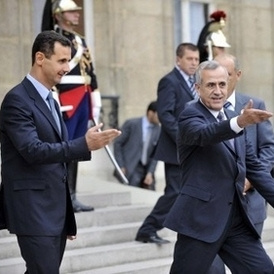Iran’s Glaring Absence in Lebanon’s Recent Developments
.jpg)
On Tuesday last week, the Syrian FM, Walid al-Muallem, made a landmark visit to Lebanon. Beirut-Damascus relations had become strained after the assassination of Rafik Hariri, former Lebanese PM.
Syria made considerable contribution in election of Michel Suleiman as the new Lebanese president and formation of the new cabinet of Fouad Siniora and it seems that bilateral ties are taking a turn.
Bashar Assad visited France after four years to set about a new era in Franco-Syrian relations. France had set election of Lebanese president and formation of its cabinet as the condition to improve its relations with Syria. Bashar Assad’s visit contributed to further progress in Beirut-Damascus ties. For the first time since Lebanon’s independence the two countries announced that they will establish embassy in each other’s territory.
Meanwhile, Syria has expressed its readiness to host Michel Suleiman in Damascus. Personally, Suleiman has close relations with Syria and intends to boost bilateral ties. Fouad Siniora will formally visit Damascus as the Syrian Foreign Ministry has announced.
Two points are worth mentioning about these developments. First, it seems that full improvement of Beirut-Damascus depends on the quality of relations between Damascus and Washington. Like Israel, Lebanon has tried to explain for U.S. the necessity of good ties with Syria. But relations between the United States and Syria are still strained and this has affected Syria’s diplomatic efforts, especially regarding Lebanon. However, Syria is trying to improve its relations with United States and put it in an acceptable condition.
The next point is Iran’s share of Lebanon’s new situation. Relations between Iran and Lebanon have become intense, especially after the 33-day war. Iran is in the same camp with Hezbollah, hence discontented with Siniora’s administration and it has suspended its relations with the Lebanese government. No serious efforts have been undertaken to restore relations, though after the recent developments in Lebanon, Tehran expressed its interest to host Suleiman.
Meanwhile, Tehran has invited Saad Hariri, leader of the parliament’s majority and influential figure of the 14th of March Front for a visit, but Hariri has postponed his visit several times. To make it worse, Saad Hariri recently visited Iraq without any official invitation. During the visit he met Iraqi officials and sent unpleasant signals for Tehran to show his displeasure with its role in Lebanon. This clearly showed how distant Iran and Lebanon have become and despite Iranians’ interest to boost relations with Lebanon, some power-holders in this Arab country are reluctant, waiting for a better opportunity.
Some analysts believe that Syria has reaped Iran’s investments in Lebanon and outperformed Tehran in achieving its goals. Iran hasn’t made serious efforts to restore relations with Lebanon and there haven’t been any mutual invitations for visit of the presidents, and these have turned into serious questions for many observers.

